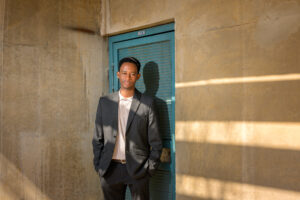
Dr Mondli Masanabo graduated with a PhD in Food Science from CoE-FS co-host, the University of Pretoria. Photo EYEscape/CoE-FS.
When Dr Mondli Masanabo crossed the graduation stage at the University of Pretoria on 14 May 2025, he didn’t just receive a degree; he marked the end of a remarkable journey of self-determination, scientific excellence, and a deep-seated commitment to creating meaningful change. From humble beginnings in Mpumalanga to cutting-edge research at the intersection of food science and polymer chemistry, Masanabo’s path has been shaped by passion, perseverance, and purpose.
Growing up in the township of Vezubuhle, KwaMhlanga in the Thembisile Hani Local Municipality, Masanabo is the youngest of four siblings, and the first in his family to attend university.
“We didn’t have role models in research where I grew up,” he reflects. “I had to carve my own path.”
Even as a child, Masanabo had a keen sense of efficiency and an aversion to waste.
“I think my natural inclination to keep things clean and organised may have, unconsciously, drawn me to sustainability research,” he says.
That early instinct evolved into a career tackling some of Africa’s most urgent issues: food insecurity, environmental degradation, and waste management.
Challenge over comfort
Masanabo’s academic journey began at the University of the Free State (UFS), where he earned a BSc in Agriculture, majoring in Food Science and Biochemistry.
“I chose food science because I was driven by the challenges we face in Africa, particularly the triple burden of malnutrition: overnutrition, undernutrition, and hidden hunger,” he explains. “I wanted to apply science to help make South Africa and Africa more food-secure.”
At UFS, he embraced student leadership roles and built the foundation for a research career that would bridge multiple scientific disciplines.
“The moment I realised how food science integrates chemistry, microbiology, engineering, and biochemistry, I was hooked,” he says. “It’s a field that allowed me to explore my curiosity while working on real-world challenges.”
And his commitment paid off: Masanabo graduated with distinction, and proceeded to earn a Master’s in Food Science at the University of Pretoria (UP), the DSTI-NRF Centre of Excellence in Food Security’s (CoE-FS) co-host — again with distinction — before embarking on his PhD, which he completed in 2024 at the age of 27, under the supervision of CoE-FS principal investigator Professor Naushad Emmambux.

Dr Mondli Masanabo was supervised by Professor Naushad Emmambux, CoE-FS principal investigator. Photo EYEscape/CoE-FS.
As the first in his family to earn a degree — let alone a PhD — Masanabo’s journey has had a ripple effect.
“My story shows that your background doesn’t have to define your future,” he says. “It’s possible to break new ground even when the path hasn’t been laid before you.”
The CoE-FS grantee’s decisions throughout his academic life reflect a clear pattern: choosing challenge over comfort. After completing high school, he deliberately chose UFS, far from home and friends, instead of institutions closer to his hometown in Mpumalanga.
“I believe that growth happens outside your comfort zone,” he says. “That allowed me to develop leadership skills and academic independence.”
At UFS, Masanabo embraced student leadership roles, gaining exposure to a broader academic community. Later, during his final year, he was one of only two food science students in the country who were sponsored by the South African Association for Food Science and Technology to attend the prestigious Institute of Food Technologists conference in Chicago, USA. That international experience broadened his perspective and further cemented his research ambitions.
Research matters
Masanabo’s PhD research, supported by the CoE-FS, focused on the valorisation of agricultural waste. Specifically, he used the stalks and leaves left behind after harvesting cowpea (a drought-resistant legume grown widely in Africa) to produce biodegradable plastics. These plant-based materials offer an eco-friendly alternative to petroleum-based plastics used in food packaging and agricultural applications.
“The biodegradable plastics we developed from cowpea waste can degrade in about 90 days, becoming part of the environment again,” he explains.
The implications of Masanabo’s research extend far beyond the laboratory. With only 9% of plastic waste globally being recycled, and over 70% ending up in landfills or in natural environments, his research offers a sustainable, locally sourced solution to plastic pollution—while also unlocking new income streams for smallholder farmers.
“The cowpea plant material left in the field is usually treated as waste,” he says. “The idea was to convert what’s seen as ‘waste’ into something valuable, like biodegradable plastic that can be used for food packaging or agricultural mulch films.”

Dr Mondli Masanabo’s research not only reduces plastic pollution but also creates an additional income stream for smallholder farmers and strengthens the bioeconomy. Photo EYEscape/CoE-FS.
His work, positioned at the intersection of food science and polymer chemistry, contributes to efforts to reduce reliance on petroleum-based plastics. The potential impact is twofold: environmental sustainability through biodegradable materials and economic empowerment by creating value from what would otherwise be discarded.
“Science must be relevant,” he says. “It must speak to the needs of the people. Whether it’s hunger, waste, or climate change; our research should aim to make life better, especially here in Africa.”
The power of support
The PhD graduate’s journey was made possible, in part, through the support he received from the CoE-FS.
“The CoE-FS provided more than just financial support; they offered a research community, mentorship, and opportunities to grow academically and professionally,” he says.
Through the Centre’s support, he attended local and international conferences, accessed state-of-the-art lab facilities, and joined a network of researchers focused on food insecurity solutions across Africa.
That support extended to placing him at the Council for Scientific and Industrial Research as a visiting student-researcher, where he deepened his materials science skills.
Looking ahead
Now a postdoctoral fellow at UP, Masanabo continues his research and mentors the next generation of scientists. His long-term goal? To contribute to African-led innovations that advance food security and environmental sustainability.
related Articles
Dr Degracious Kgoale’s mission to improve food safety in informal markets
Dr Degracious Kgoale is the first in her family to hold a doctorate. Photo EYEscape/CoE-FS. Degracious Moloko Kgoale, who recently…
PhD funding opportunity: Land governance and responsible value chain management in the...
Photo Tim Mossholder/Pexels. Please liaise with your institution’s research/postgraduate office about the institution’s internal closing date. The onus is on…
Food, power, and inequality: Vision for a fairer food system
Oscar Sithole is a PhD candidate at the University of Pretoria, and a grantee of the CoE-FS. Photo EYEscape/CoE-FS. Oscar…



